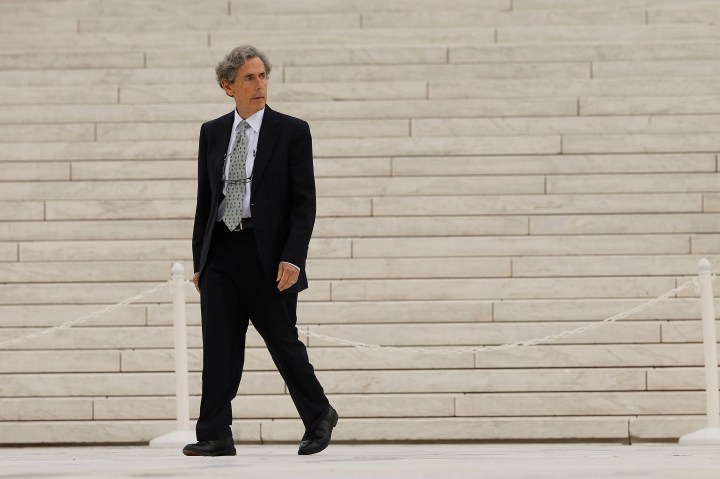
A matter of $80,000: The Atlanta-based venture capital Fearless Fund defended its grant program for Black women entrepreneurs in court this week. The $80,000 contest represents less than a drop in the bucket of venture capital, but this isn’t really about the money; It’s the latest front in a broader effort to dismantle diversity, equity and inclusion programs in the workplace.
A familiar face: The American Alliance for Equal Rights filed the lawsuit heard by the 11th U.S. Circuit Court of Appeals yesterday. The conservative group is led by activist Edward Blum, who was also behind the case that led the Supreme Court to strike down affirmative action in college admissions last year. That ruling kicked off a wave of challenges to other diversity initiatives, and several companies have already removed race-based criteria for fellowships that were meant to diversify their workforces.
Heard of Section 1981? It’s part of the Civil Rights Act of 1866 meant to protect formerly enslaved Black Americans by barring consideration of race in creating and enforcing contracts. Now, it’s the legal justification for several lawsuits that claim workplace diversity programs are a form of “reverse discrimination.” Blum’s case against Fearless Fund is just the latest.
Representatives of Fearless Fund argued their grants are not contracts, but charitable donations protected by the First Amendment, though a federal judge didn’t seem convinced.
The bigger picture: Civil rights advocates worry dismantling DEI initiatives could further entrench structural racism. Fearless Fund estimates less than 1% of the $288 billion venture capital funds invested in 2022 went to Black women. And the organization’s leaders reported that after the lawsuit was filed, many of its major backers, including Mastercard and J.P. Morgan Chase & Co., have declined to invest further.
Smart in a shot

TikTok soft launched a new feature this week that would make every single video on the platform shoppable. The Chinese social media giant is testing technology that automatically identifies objects in videos and then directs users to buy similar products available in the TikTok Shop, which the company launched last September to compete with the likes of Shein and Temu.
New York Magazine writer John Herrman described the TikTok’s aggressive expansion to digital Dollar Store as “a fascinating mess.” He learned firsthand when he listed a used mechanical pencil and attracted 1,200 viewers materialized in his livestream hawking it. It’s a sign of just how heavily TikTok’s algorithm is weighing shopping content right now. The platform is subsidizing shipping and fees too, spending at least $4 to facilitate Herrman’s $0.69 transaction.
But how long can TikTok act like a scrolling informercial before users who prefer cute puppies over ads for questionable dupes jump ship? The app’s monthly active user growth has slowed from 12% year-over-year in 2022 to 3% year-over-year in 2023. If the downward trend continues, perhaps Tech Crunch is right when it suggests TikTok’s embrace of e-commerce may be detracting from its mass appeal.
The numbers
State senators in Georgia advanced legislation this week that would legalize sports betting in the Peach State, using the revenue to fund public education programs. Let’s do the numbers.
38
The number of states, plus the District of Columbia, where sports betting is legal. Another four states, including Georgia, are considering legislation or ballot initiatives to legalize sports gambling.
$26.8 billion
Between 1993 and 2023, Georgia has transferred $26.8 billion in lottery revenue to fund voluntary pre-school programs and college scholarships. Some critics oppose this system, saying it’s a de facto regressive tax because poorer households tend to spend more on the lottery than those with higher incomes.
1.3 cents
The nonpartisan economic think tank Milken Institute reported that sports betting generated an average of 1.3 cents of net government revenue for every dollar spent on bets, compared to 30 cents of revenue for every dollar spent on lottery tickets. Lawmakers that hope to use sports betting revenue to close budget gaps may have to temper their expectations.
5% to 25%
Once the winners are paid out, online sportsbooks keep between 5% and 25% of all the money users wager. In other words, online betters typically lose 5 cents to 25 cents for every dollar they spend on a sports bet.
None of us is as smart as all of us
Tell us what’s making you smarter at smarter@marketplace.org. We’d love to include your recommendation in a future newsletter.
Scholarship cuts: Intern Thalia Menchaca is reading a Dallas Morning News story about University of Texas, Austin decision to eliminate scholarships and other support for undocumented students in the wake of a state law banning diversity, equity and inclusion programs at state colleges and universities.
Self-promotion sucks: Producer Alice Wilder is reading a Vox article about the amount work that goes into building a “personal brand” online.
Hot Wheels history: Host Kimberly Adams is reading a Washington Post essay about teaching economics with a collection of diecast toy cars (gift link).
There’s a lot happening in the world. Through it all, Marketplace is here for you.
You rely on Marketplace to break down the world’s events and tell you how it affects you in a fact-based, approachable way. We rely on your financial support to keep making that possible.
Your donation today powers the independent journalism that you rely on. For just $5/month, you can help sustain Marketplace so we can keep reporting on the things that matter to you.

















